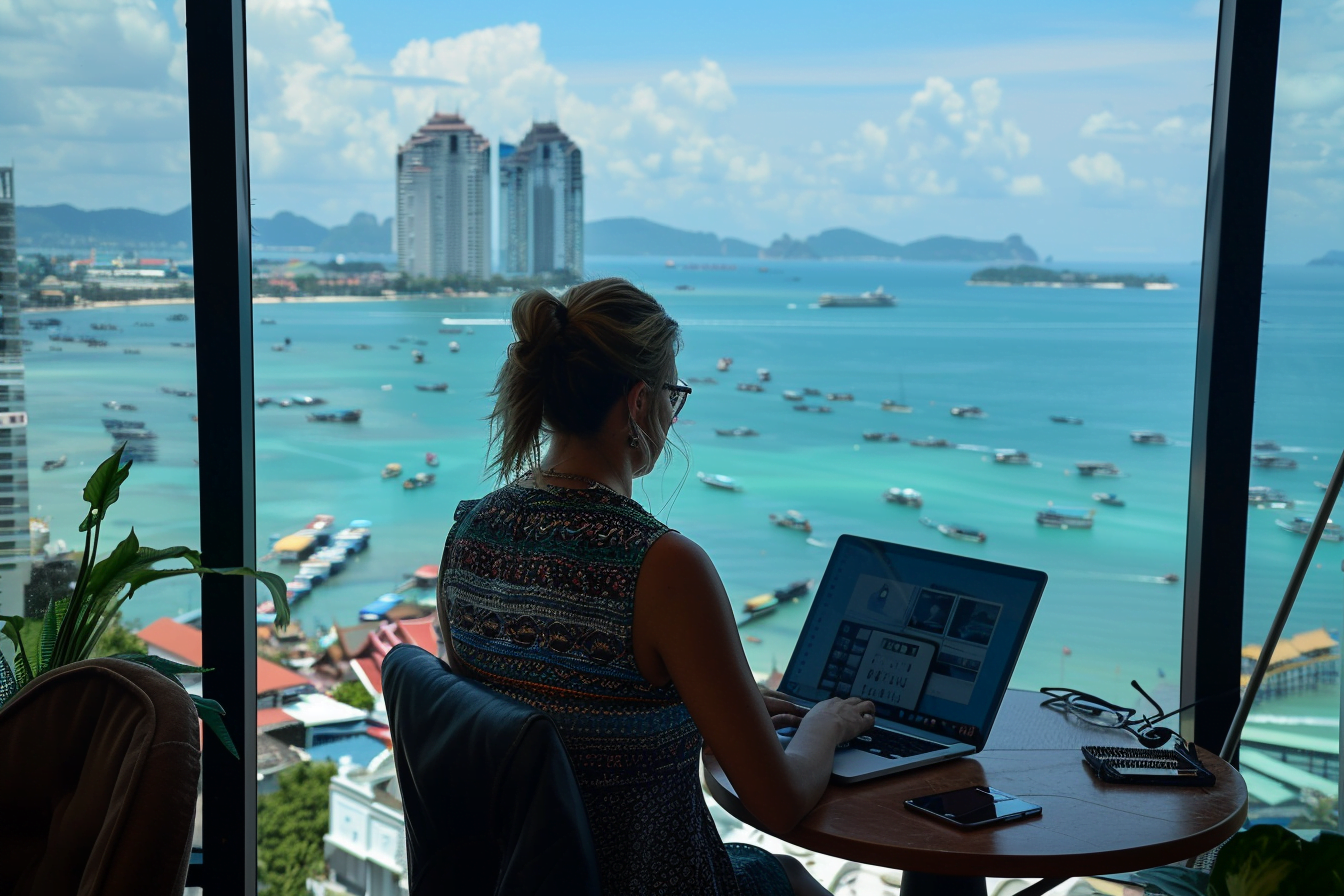Explore the latest options and process for securing a work visa for digital nomads in Thailand. Join the remote work revolution seamlessly!
In an era where remote work is not just a trend but a way of life for many, it may come as a surprise that in Thailand, even the most inconspicuous online activities performed by digital nomads are subject to stringent work regulations. Thailand, renowned for its tropical landscapes and cultural richness, has become a beacon for digital nomads worldwide. Yet, many are unaware that activities as commonplace as blogging or managing an online store from this Southeast Asian paradise may require a work visa for digital nomads in Thailand. With the recent rise in people seeking a digital nomad visa Thailand, understanding how to apply for a work visa in Thailand and the Thailand work permit requirements are crucial for those wishing to embrace remote work while indulging in the Thai lifestyle. Indeed, the legalities surrounding a remote work visa Thailand play a pivotal role in shaping the expatriate community and setting parameters for digital nomadism in the country.
Key Takeaways
- Understanding the necessity for a work visa for digital nomads in Thailand is essential due to stringent local laws.
- Managing online businesses, website design, or even blogging could be deemed as ‘work’ requiring a proper visa.
- Some activities, like remote teaching or small-scale family business endeavors, may operate in a grey area of the law.
- Currently, Thai law lacks specific regulations tailored for digital nomads, which has resulted in a degree of leniency from authorities.
- Long-term stay for the purpose of work without a proper permit remains technically illegal.
- Recognizing which activities necessitate a work permit is crucial for legal compliance and continued residency.
Understanding Thailand’s Visa Regulations for Digital Nomads
For the burgeoning population of digital nomads discovering the allure of Thailand’s tropical climate and vibrant culture, navigating the visa landscape is a vital step. As remote work blurs the lines between travel and employment, understanding the nuances of Thailand’s visa system becomes crucial.
Types of Work Visas in Thailand
Thailand caters to a diverse range of professionals with multiple work visa options. These visas are essential for those who wish to navigate the legal system while embarking on self-employed ventures or remote work in the country. Understanding each category’s unique specifications is the first step in legalizing your status.
Defining “Work” for Digital Nomads in Thailand
The Thai authorities define ‘work’ broadly as any act of exerting effort or employing expertise, potentially encompassing the digital nomad’s online undertakings. The authorities primarily target occupations that could affect local employment or security, but the absence of specific regulations for digital nomads creates a grey area that many exploit.
Current Legal Stance on Remote Work in Thailand
Although Thailand recognizes the digital economy’s growth, the law has yet to catch up entirely with these new work modalities. Foreign nationals undertaking substantial local business activities or employing local resources need the appropriate work permits for digital nomads in Thailand. However, a level of tolerance prevails, provided there isn’t a direct threat to local jobs or security.
In this complex landscape, the Thailand self-employed visa emerges as an option, but it comes with strings attached, including stipulations about earning within the country. Meanwhile, visa requirements for working remotely in Thailand remain intricate, demanding a detailed look at what current laws entail for the modern-day remote worker.
| Visa Type | Purpose | Duration | Permit for Work Required |
|---|---|---|---|
| SMART Visa | Specialized industries, entrepreneurs | Up to 4 years | Not needed |
| Non-Immigrant B Visa | Employment/Own Business | 1 year, renewable | Yes |
| Non-Immigrant O Visa | Volunteering, dependents of Thai residents | 90 days to 1 year | Yes, depending on activity |
| Non-Immigrant ED Visa | Education purposes | 1 year, renewable | Part-time work permitted |
Work Visa Options for Foreigners in Thailand
Exploring the myriad of work visa options for foreigners in Thailand reveals a complex landscape, beset with regulations designed to cater to a diverse set of professionals, from digital nomads to high-net-worth individuals. Those interested in understanding the full scope of Thailand visa regulations for digital nomads and the available visa options for remote workers in Thailand will find the following breakdown invaluable.
Tourist Visa: Limitations and Legalities for Working
Despite being a popular choice among travelers, the tourist visa is restrictive when it comes to employment. It is important to note that engaging in any form of work on a tourist visa is prohibited by Thai law, thwarting the plans of many a digital nomad seeking to balance exploration with remote work.
Education Visa: A Pathway for Studying and Working Part-time
For avid learners and culture enthusiasts, the education visa can serve as an entryway to part-time work opportunities. This visa permits foreigners to immerse themselves in Thai culture through study and also to work part-time, typically at their place of education, blending knowledge acquisition with experiential learning.
Thailand Elite Visa: Benefits for High-earning Digital Nomads
The Thailand Elite Visa is a prestigious option for affluent digital nomads who can sustain their business remotely without the need to seek local employment. This visa bestows long-term stays and a multitude of other privileges but does not allow for direct employment in the Kingdom.

To clarify the types of work visas in Thailand, the following table presents a comparison of the fundamental characteristics of each visa relevant for digital nomads and remote workers:
| Visa Type | Duration | Work Eligibility | Investment Required | Suitable for |
|---|---|---|---|---|
| Tourist Visa | Short-term | Not Permitted | N/A | Travelers |
| Education Visa | Long-term | Part-time at place of study | N/A | Students/Cultural Immersion |
| Thailand Elite Visa | Extended-term | None (No Employment) | Membership Fee | High-net-worth Individuals |
We must be cognizant of the fact that when navigating through the types of work visas in Thailand, adherence to visa stipulations is critical. Whether seeking the vibrancy of Bangkok or the tranquility of Chiang Mai, legal compliance ensures a smooth experience for remote workers and digital nomads alike in this captivating country.
How to Apply for a Work Visa in Thailand
Embarking on the journey to obtain a work visa in Thailand involves understanding the intricacies of the application process. Initiating this journey requires careful planning, accurate documentation, and due diligence to meet the work permit requirements for expats in Thailand. A systematic approach enhances the likelihood of a successful application.
Step-by-Step Application Process for Expats in Thailand
The first step is to determine the appropriate visa category that aligns with your employment or business objectives in Thailand. Once the visa type is selected, gathering the required documents is your next move. The process often includes a visit to a Thai embassy, submitting your application, and awaiting approval. The embassy may request additional information or an interview session to ascertain your eligibility.
Required Documentation and Fees
A crucial part of the work permit process for expats in Thailand is compiling the necessary paperwork. Typical documents needed include proof of employment or business plans, proof of income or financial stability, educational certificates, and a valid passport. Keep abreast of the current Thailand work permit requirements to ensure a smooth application process. The fees associated with the work visa application can amount to approximately USD 300 but may vary depending on your specific circumstances and the visa category.
Dealing with Thai Embassies: Tips and Experiences
Interfacing with Thai embassies is an integral aspect of how to apply for a work visa in Thailand. Effectively communicating your purpose and ensuring all paperwork is flawlessly completed can make a significant difference. It is often recommended to engage with a visa consultant or agency that has a profound understanding of the requirements and processes. They can offer invaluable assistance in navigating the complex regulatory landscapes.

| Documentation | Visa Type | Estimated Fees (USD) |
|---|---|---|
| Valid Passport | General Work Visa | 300* |
| Proof of Employment | Business Visa | |
| Financial Stability Proof | Investment Visa | |
| Educational Certificates | Educational Visa |
*Fees are approximate and subject to change based on embassy policies and application details.
The Work Permit Process for Expats in Thailand
Navigating the work permit process for expats in Thailand, a rigorous and detail-oriented task, requires a keen understanding of the local laws and an adherence to specified criteria. For those seeking to delve into the vibrant tech scene, the Smart S visa stands as a beacon of opportunity – enticing innovators to contribute to Thailand’s economic progress. Yet this prospect comes with certain stipulations, such as the critical necessity to inject local talent into the mix, illustrated by the requirement to employ at least four Thai nationals for every foreign expert, which is not just a legal formality but also a gesture of goodwill towards Thailand’s workforce development.
The route to securing this essential documentation for remote workers introduces applicants to the complexities of the Thailand digital nomad visa, especially designated for those who prefer the flexibility of remote work over traditional office environments. The intricacies of this process touch upon various aspects, from delivering adequate financial documentation to satisfying the provisions that govern advertised work activities within Thai jurisdictions. It’s worth noting that despite the allure of working from exotic locales, expats must remain vigilant to maintain harmony with Thailand’s administrative expectations.
In light of these regulations, particularly for expats associated with enterprises meeting substantial revenue benchmarks or those enlisted as public entities – the Long-Term Resident (LTR) visa surfaces as the answer to their quest. A methodical approach to learning and understanding the Thailand work permit requirements not only facilitates a seamless transition into the local business ecosystem but also establishes the groundwork for a stable and legal residency. Therefore, embarking on this administrative voyage with a comprehensive grasp of the prescribed conditions can substantially enhance your chances of professional integration within Thailand’s borders.
FAQ
What types of work visas are available for digital nomads in Thailand?
Thailand offers a variety of visas, some of which may be suitable for digital nomads based on their specific circumstances, although there is no dedicated digital nomad visa. These include the Smart “S” visa for start-up entrepreneurs, the Thailand Elite Visa for high-net-worth individuals, and the Long-Term Resident (LTR) visa aimed at remote workers employed by companies outside Thailand.
How is “work” defined in Thailand for digital nomads?
The Thai legal definition of “work” includes exerting effort, using knowledge, or applying skills to produce something. For digital nomads, even remote activities like blogging about their experiences in Thailand or managing an online business could be considered work if it significantly engages the local market or utilizes Thai resources. A work permit is required if you’re conducting such activities.
What is the current legal stance on remote work for digital nomads in Thailand?
While Thailand does not have specific regulations tailored for digital nomads, remote work that does not compete with the local job market or pose a security risk is generally tolerated. However, officially, long-term remote work within Thailand should align with the proper work permit requirements to avoid legal complications.
Can I legally work while on a tourist visa in Thailand?
No, the Thai tourist visa does not legally permit any form of employment, including remote work or digital nomad activities. To work legally, one must obtain the appropriate work visa or permit.
What are the work possibilities under an Education Visa in Thailand?
The Education Visa allows for part-time employment, but only at the educational institution where the holder is studying. It can be an opportunity for cultural immersion and limited work, under the institution’s discretion.
What benefits does the Thailand Elite Visa offer to digital nomads?
The Thailand Elite Visa is primarily a long-term stay option for affluent individuals, offering benefits like a renewable five to twenty-year visa, expedited immigration procedures, and access to various privileges. However, it does not permit direct employment within Thailand.
What is the step-by-step application process for expats applying for a work visa in Thailand?
Applying for a work visa in Thailand typically involves obtaining a job offer or starting a business, preparing the necessary documentation, submitting the visa application at a Thai embassy or consulate, getting approval from the Ministry of Labour if required, and then entering Thailand to obtain the work permit at the local office.
What documentation and fees are required for a Thai work visa application?
Required documentation may include a passport, job offer letter or business registration, proof of educational qualifications, medical certificate, and police clearance. Fees can vary but are around $300 for government processing. Visa renewals often require evidence of continued employment or business operation in Thailand.
How should one deal with Thai Embassies during the work visa application process?
It’s essential to research and understand the specific requirements of the Thai Embassy or Consulate where you will apply, as they may vary. Preparing your documents carefully, being patient with the process, and possibly consulting with a legal professional or visa consultant can help in successfully navigating the application process.
What are the requirements for expats to obtain a work permit in Thailand?
Expats must have a non-immigrant visa, be employed in a role that does not compete with the Thai workforce, comply with the job descriptions under the Foreign Employment Act, and have an employer who can provide necessary documentation. Additional criteria include financial thresholds and the hiring of local staff for certain visa types, such as the Smart S visa for entrepreneurs.






Leave a reply